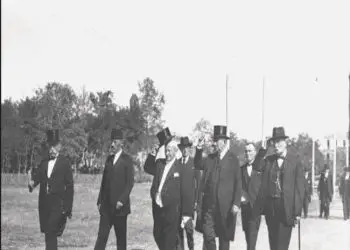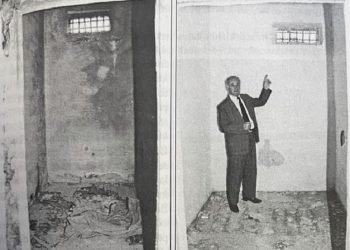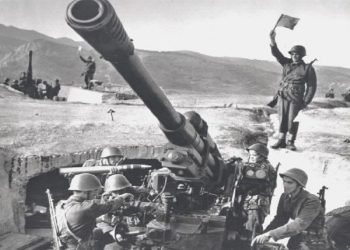By Sokrat Shyti
Part Sixty-Five
Memorie.al /The writer Sokrat Shyti is the “great unknown” who for several years has shown the tip of the iceberg of his literary creativity. I say this based on the limited number of his published books in recent years, mainly the voluminous novel “The Ghost Night” (Tirana 2014). The novels: “BEYOND MYSTERY,” “BETWEEN TEMPTATION AND WHIRLPOOL,” “THE DIGGING OF NIGHTMARES,” “THE SHADOW OF SHAME AND DEATH,” “COLONEL MAIN HAND,” “THE FADING HOPES,” “THE TWISTS OF FATE” I, II, “SURVIVAL IN THE COWSHED,” as well as other works, all novels with 350 – 550 pages, are in manuscripts waiting to be published. The dreams and initial enthusiasm of the young novelist, returning from studies abroad full of energy and love for art and literature, were cut short early by the harsh blade of communist dictatorship.
Who is Sokrat Shyti?
Having returned from studies at the State University of Moscow right after the rupture of Albanian-Soviet relations in 1960, Sokrat Shyti worked in “Radio-diffusion” (which at that time was located on Kavaja Street), in an editorial office with his journalist friends – Vangjel Lezho and Fadil Kokomani – both of whom were later arrested and subsequently executed by the communist regime. Besides the radio, 21-year-old Sokrat had passionate literary interests at that time. He wrote his first novel “Madam Doctor” and was on the verge of publication, but… alas! Shortly after the arrest of his friends, to fill the cup, one of his brothers, a painter, escaped abroad.
Sokrat was arrested in September 1963, and in November of that year, he was interned along with his family (his mother and little sister) in a place between Ardenica and Kolonje of Lushnje. For 27 consecutive years, the family lived in a cowshed made of reeds, without windows, while Sokrat was subjected to forced labor. During those 27 years, he was legally obliged to report three times a day to the local authority. He had no right to leave the place of internment, was deprived of any kind of documents, etc. In these conditions, amid a cowshed, he gave birth to and raised his children. Precisely from this event, or more accurately a very long story of persecution, he based his writing of the book “Survival in the Cowshed”!
Agron Tufa
Continued from the previous issue
EXCERPT FROM THE BOOK “SURVIVAL IN THE COWSHED”
The company commander watched with amazement and pleasure all the actions from the hut, in front of his hut. He was glad that these energetic boys did not cause him any trouble, especially they were not quarrelsome and rowdy, to make his life miserable. Before he came to this lost place, he had not thought and in no way believed that he could spend peaceful nights and days here, without any troubles. On the contrary, the moment they called him and communicated to him the task, it seemed to him as if the end had come, that they would punish him by interning him, because in that wilderness without roads and telephone connections, relationships with familiar people, and above all with family, are automatically severed.
But to his great surprise, an incredible event occurred, which without exaggeration can be called a miracle, due to the fact that his soldiers turned out to be good boys, capable and capable, to arrange their own lives, and they even took care to feed the commander as well as possible! In these fortunate conditions, completely freed from all military obligations, his mind began to project thoughts and ideas on how to spend his time pleasantly, until he finally found a very interesting solution: he bought two lambs at a cheap price from a peasant, painted their heads with red paint to distinguish them, and began to go for walks with them, every morning and afternoon. It was a truly relaxing pastime, since no one disturbed him, and he spoke without any fear in front of his lambs, who understood him and responded to him with joyful bleating. Naturally, he was happy when he saw the changes: that the lambs gained weight as the days passed, and horns were growing on their foreheads!
Of course, he would not get into this dangerous trouble if he had strained relations with the soldiers. However, he still did not feel completely at ease, he was tormented by the terrible harassment, lest the captain spy on him in the brigade! When he expressed his concern to me, I immediately discussed it with the cook, convinced that he would find the right solution. He immediately showed himself ready to lend his assistance, to remove the collar of suspicion from the neck of the company commander: he spoke amicably with the captain, telling him to leave the “old man” to his own devices, because it only takes a few minutes to put yourself in his place to understand what it means to be alone with your family, at an age close to retirement.
– “Then you have to consider how well he behaves with the soldiers. He doesn’t bother us either.” Immediately after this conversation, the captain swore on the children’s heads that he would never allow himself to become a spy.
– “And here I am telling you face to face, like a man to a man: when a man gives his word, he sacrifices his son’s head, and not to lead himself to espionage, the filthiest vice of man…”, – repeated the captain in a tearful tone, in order to convince his interlocutor. When the cook briefly explained the deal to me, and ordered me with sufficient certainty to calm the commander, in the end he mentioned the condition to me; why can’t the captain play tail, no matter how treacherous and cunning he is.
– “So you led him into your trap?” – I asked him with a laughing look.
– “I discovered his deception during the supply, and I made it clear to him from the beginning that this sin can only be washed away by a clean attitude, from now on. He swore with tears in his eyes, on the head of the scoundrels, that he would never repeat this act again! And he promised to fulfill any request for the sake of manhood, which I did not report to the company commander”.
After two weeks, the order came from the commissar of the Laç brigade: to urgently report there, to carry out an activity for an indefinite period of time! The company commander pulled me aside to express his concern once again, saying to me: “Even if the cook took it upon himself to shut the captain’s mouth with a swab, the possibility that I am raising two pets exists, maybe one of the soldiers is babbling somewhere”. I calmed him down, assuring him that the soldiers are loyal.
– “Dad’ keeps them under constant control. So don’t ever break ties with ‘Dad’ and the cook. Soldiers are very clever. They know how to maneuver and hide their animals if the insidious battalion commander suddenly appears. The only suspicion remains that soldier with the çifteli, the ‘guardian’ of the mules. But ‘Dad’ is also a scoundrel. However, if any issue arises during my absence, I will urgently go to ‘Dad’s’ brigade in Laç, so that we can both take the necessary protective measures. I set off on foot with the captain along the coast. The narrow path wound between the mules right next to the water. It seemed to me that a scene with a landing of saboteurs was being filmed!…
– “How long will it continue like this?” – I asked him curiously, considering whether I would come back alone.
– “If we walk at this pace, it will take half an hour,” – he answered without hesitation looking back.
Fortunately, we were not late in Patok, we quickly found a gravel truck. Upon arriving at the brigade checkpoint, the captain told the guard officer that the commissar was waiting for the journalist. Apparently, he was aware, because he immediately notified someone by phone, and a little later the rear non-commissioned officer arrived, who told me to go with him, to show me where to sleep.
– “From this moment on you are part of our force: you will eat and sleep here – he emphasized. – As for the activity, the chief of propaganda and the chief of culture know that… – he added, shrugging his shoulders. – But first I am accompanying you to the brigade commissar”.
This time I was not emotional, because the name of the brigade commissar meant nothing to my memory, quite unlike the feeling of anxiety when I presented myself to the commander of the FUD. So, the acquaintance and conversation passed without leaving any noticeable traces. He told me that an order had come from the Political Directorate to develop cultural and artistic activities, with the theme of strengthening and further increasing revolutionary vigilance.
– “But we have neither the material base nor the conditions, like those of the FUD – he pointed out. – Therefore, at first you will write the scenario of the activity. The guiding points will be given by the heads of propaganda and culture. Further, we will proceed according to the instructions of the Political Directorate, which tells us that we must without fail cooperate with the Palace of Culture of the city, since the performance requires the close monolithic connection between the people and the army to emerge. This means that you, together with the director, will be the leaders of the group”.
Even without meeting and talking to the two brigade chiefs, I had a very clear idea of how the text should be drafted. That is why I immediately went to the city’s Palace of Culture to get acquainted and exchange ideas with the director about the joint program. After the general conversation, the director proposed to drink a calming coffee, saying that; “we both have experience in such performances, we know how to dot the i’s”. After we compiled the scheme of the performance, thanks to the experience of the Radio, I started writing the text, since such writing does not need special inspiration, like genuine artistic creativity.
(When I worked as an editor at the Radio, I would occasionally write down several program texts during the day). As soon as I finished it, I gave it to the director of the Palace of Culture to read and edit, taking into account the order of the brigade commissar, that we are both leaders of this activity. He made only two changes in the order, and immediately showed himself ready to present the program to the two bosses, so that they could express their observations.
– “From my experience, cooperation with the military,” the director emphasized, “is generally very difficult. Therefore, I advise you, socially, to have the patience of a pig, and to wait until the end without objecting to what they have to say, taking into account that they spin every argument around an ideological axis, they themselves do not express any opinion.”
They read the text with terrible care, driven by fear that they had missed a small detail that would distort the entire content. But to show themselves to be professionals in this field, despite the fact that they wore military uniforms, they underlined a few lines and put a note on the side. Since it was still time to give it the final touches, the four of us gathered at the House of Culture to review all the remarks, so that after the approved changes, the basic text would be determined, which would be submitted to the brigade commissar. I noticed that during the reading, he focused his attention mainly on the words, which served as mortar to bind the bricks, he wanted to know if these had the right amount of cement and could withstand the swings of criticism. Then, before giving the answer, he noticed our four signatures, and without delay said to us: – “Begin”!
Thanks to the cooperation with the director of the House of Culture, the main structure of our performance, which was almost erected, (taking into account that amateur groups of folk songs, dances and instrumentalists were an integral part of the activity). Our work would focus on the reciters and the presenter, so that they would be in harmony with the entire artistic program.
After ten days, the performance was given a rehearsal before the brigade commissar and the two chiefs. The commissar was satisfied, since the performance naturally conveyed the red thread of communist ideology, and the selected parts of the recitations, which were in line with the instructions of the Political Directorate, were a continuation of the songs and dances.
Therefore, without any hesitation, he gave approval to give the performance in all the points that depend on the Laç brigade, as well as to carefully review any remarks by the two leaders, in order to take them into account on the night of the competition at the corps level. The success of the performance and the receipt of an honorary diploma from the jury served as an incentive for me to be awarded a fifteen-day leave. When the time came to go to the brigade commissar to thank him for the appreciation of my work, I had the idea, as soon as I had the chance, to point out the biggest event of my life, that I was getting married in September…!
– “First of all, I wish you well in advance: that you will inherit! Second, I want to say that this time, you have the leave as a gift from me, for honoring us. Third: here I give you my word that, one week before the wedding and two weeks after the wedding, you will be on the usual leave”.
After this promise, I immediately left by train for Lushnje. I was quite pleased that I had secured the leave for the month of September. These days were necessary, not only to relax with loved ones, but also to review from beginning to end, the general scheme of preparations, with limited financial possibilities. First of all, it was necessary to specify the place where the bride would be received. This for two reasons: First, the Lushnje district, with a single taxi, could not cope with the numerous needs of the citizens. Therefore, it was necessary to talk in advance and agree with the driver on the specific day, although even this did not give a full guarantee, since until the day comes, who knows how many urgent requests will arise!
Secondly, weddings in these very difficult economic times (with very low wages and severe food shortages), are labeled as a micro-bourgeois luxury, for families with low incomes. And since there are no coronations, (after the barbaric attack of the youth against religious cults, these were closed and turned into warehouses and facilities in “service” of the population!), all the attention of the wedding guests should be focused on the external ceremonial side, with as little expense as possible and more songs and entertainment.
Considering these two very strong concrete reasons (as well as the fact that during these months in military service, I had not brought a single lek into the house), the least expensive way was found as a practical solution, without taxi conditions for picking up the bride, with the reasoning that the distance from the older sister’s house to the bride’s house was no more than three hundred meters, so one can go and stand while singing, without fatigue or effort. Meanwhile, this solution eliminates the waste that often appears in such cases, since everyone is given the opportunity to participate in the bride’s escort ceremony, neither the means of transportation hinders them nor does it increase the expenses of the reception at the bride’s house, considering that they will not be seated to eat and drink.
Once the conditions for the bride’s reception were finally determined, after the mother’s conversation with her wonderful brother in Berat (who thought that the option of hosting the wedding at Reta’s house would be a good solution even for guests from far away, because they would come and go during the day on the local buses, which would be completely impossible if the reception was held in Kolonjë), the details of how to arrange the lunch were worked out with as little expense as possible. I was extremely surprised when I was informed of the extraordinary and shocking generosity of the kind-hearted Shaja, who had expressed her desire, together with her son, to bring a basket and three trays of yshmer for the wedding lunch, to express her pleasure at being able to participate in this happy day, when I would be paired with the bride of my heart!
September 28, the day of the bride’s wedding, came embroidered with the radiance and brilliance of the sun’s rays, with an infinitely blue sky, warm and gentle. It was the most significant day in my life, which would crown and sacrifice an extraordinary love, against which, under the guise of anti-human politics, parents, relatives and society rebelled, as if a terrible blasphemy was being committed by the two of us!
Our large group set off at half past nine, singing: “We will, we will not, in the middle of the forest we will”. As we passed in front of the metal gate of the Internal Branch, I was overcome by a feeling of pride that the Dictatorship of the Proletariat could not defeat our love, despite all the efforts to suffocate it while it was a baby in the cradle! It was precisely this pride mixed with the joy of the crowning of love that made me feel as if I were flying on the wings of my imagination, towards a new family life, even though I knew that ahead would come a multitude of insidious thorns and thorns, to frighten and embitter our happiness, with threatening obstacles.
In front of the metal gate of the Internal Branch, I noticed the internment – deportation officer, who waved at me with a smile, as if to say to me: “I’m glad you made it!”. This sign became an incentive for the accompanying group not only not to interrupt the song, or to lower their voices, when we were passing in front of the fearsome gate, but on the contrary to increase the rhythm more, because everyone without exception, was confused by the triumph of good, against evil. It was clear that even the occasional passers-by, participated with their smiling glances in our joy. Through bright glances, heartfelt congratulations came towards me, telling me almost openly that; all your efforts gave us strength and hope, not to succumb to threats!
When we crossed the bridge of the stream, the messengers from the other side, gave the signal of the arrival of the bridegrooms. Therefore, their choir, began to sing: “The mountain is full of grapes”. Immediately our group replied: “The boy with a frown is coming, to take the bride with an arched eyebrow”. The space of the flower garden was overflowing with curious people, who sang one song and another. After the hugs and handshakes of the two brides, the main part went inside, as much as the space of the alcove and the corridor would hold, the others continued to sing outside.
Arqelin and I sat in the special corner, confused by earthly and heavenly happiness. The choir of our party began the song: “Black eyes, thin eyebrows, broken apple cheeks”, which was followed by their choir: “Even the stones of the alley”. Then the ritual of treating with cherry, peach, apple, orange, fig, walnut syrups began. My bride had to share the walnut loukoumades. At the end, it was the turn of the glasses with jam and rose syrup. Before we said goodbye to Arqelin’s parents and close relatives, the two choirs started singing together:
“Two sheep three hundred pare, get up, couple, take us a dance”! The eyes of Ula’s mother and Arqelin, were filled with tears at the moment of separation, even though they would see each other again the next day!
– “I know what you will ask me for your daughter”, – I whispered to my mother-in-law near her ear, when she hesitated to give me advice. – “I assure you that she will not lack my care. When you love someone spiritually, respect automatically arises, because you feel yourself the twin of life”.
She kissed me on the forehead, convinced by my words. I went to my uncle, Arqelina’s father, to tell him that you are a wise, hardworking, and unsatisfied father, but you have a big vice!
– “Don’t tell me!”… – he added, surprised with an expectant look!
– “You smoke a lot! You harm yourself, and you disturb your family members. Do you agree?” – “I can’t quit. That’s why it’s called a habit…” – he admitted with a sense of shame.
When the hugs and greetings ended, our choir began the accompanying song: “Vemi a s’vemi, në mes te pyslit do vemi”, – a romantic song dedicated to love, because the couple’s shelter is compared to the nest of birds, who chirp happily from the feeling of mating, knowing that their nursery will be filled with the renewal of life.
Arqelini, dressed in a white dress, without a veil, with a light toilet, sparkled and shone under the rays of the sun! From her light, the amazing charms of the girl in love were spread, to show passers-by, but above all her friends and peers, what spiritual and mental strength this earthly and heavenly feeling gives. Those who know how to read the portrait of love, did not find it difficult to absorb within the sparkling light, the miracle that happened, how the extraordinary love was born and grew rapidly, why the God who gave her this powerful feeling, endowed her with the persistent strength of strange transformations, radically alienated her, from a very wise, taciturn and obedient girl, into a stubborn rebel, ready to bravely challenge and face the heated opposition of her parents, relatives and politics!… Memorie.al
Tirana, (January – May) 2015




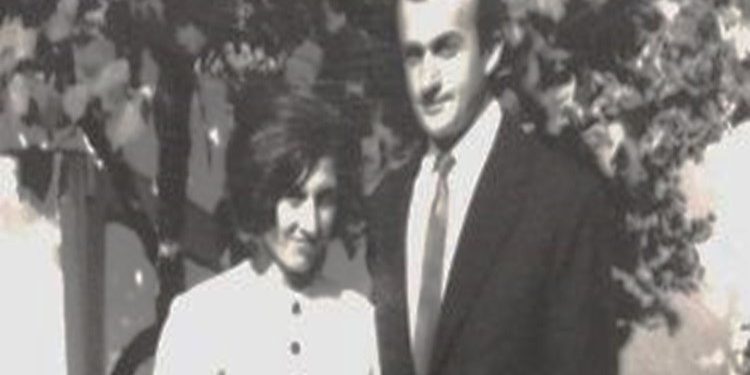
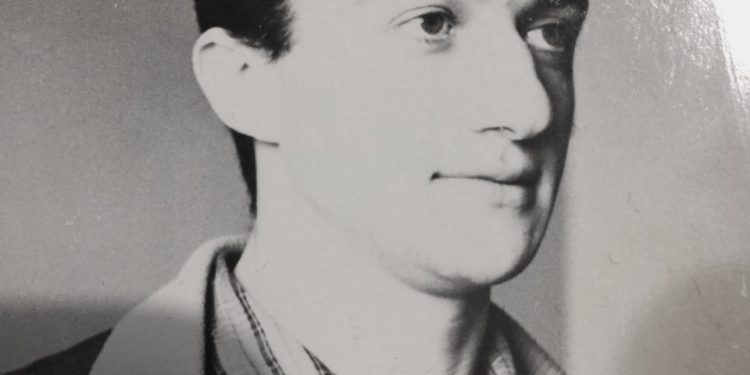
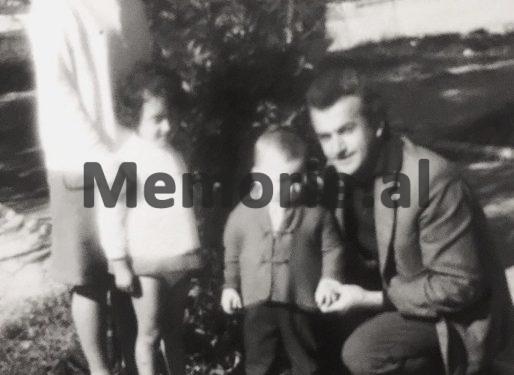
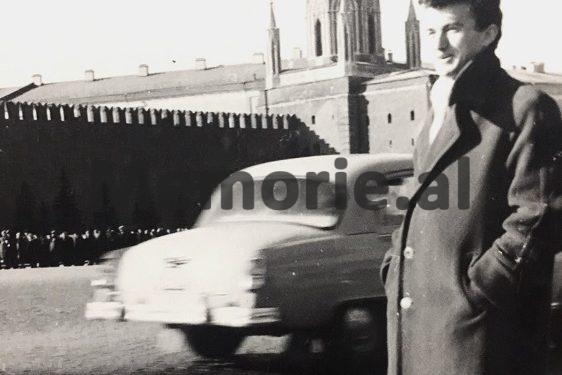
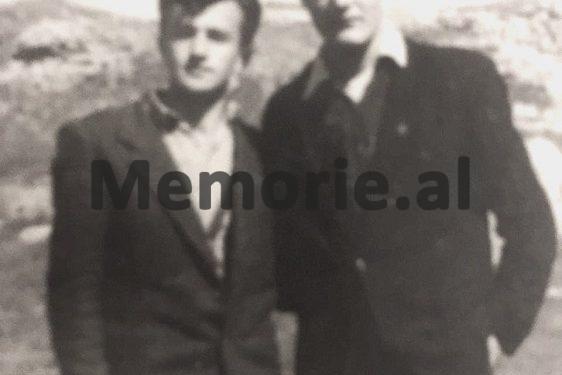
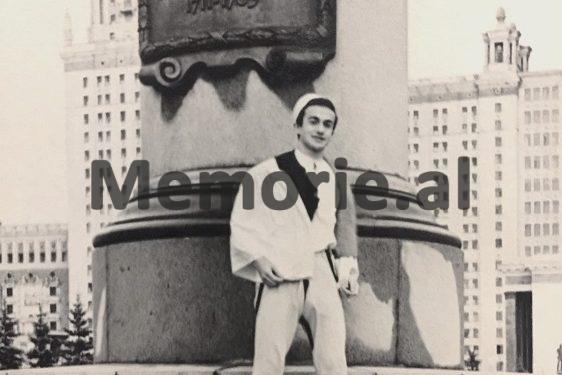
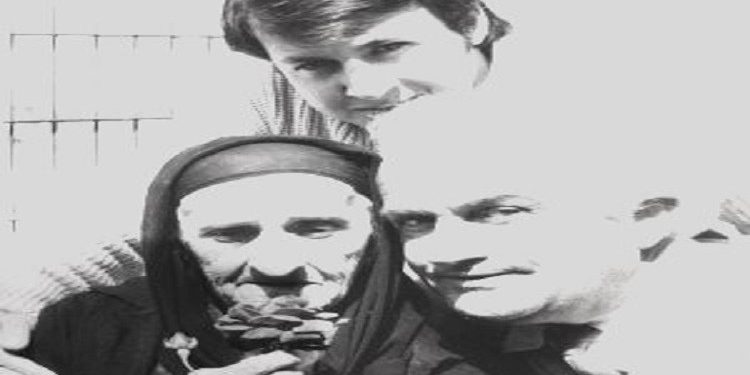
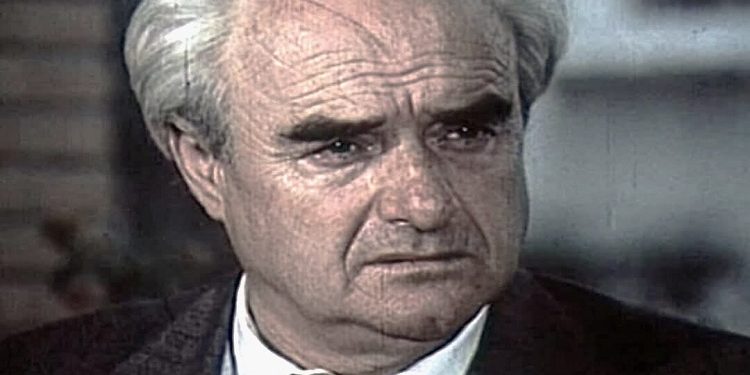
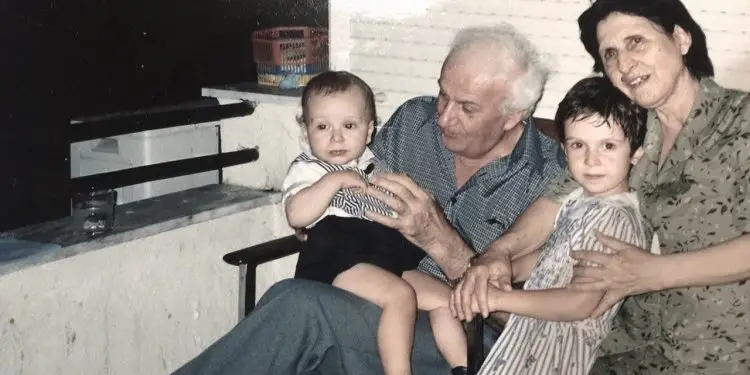
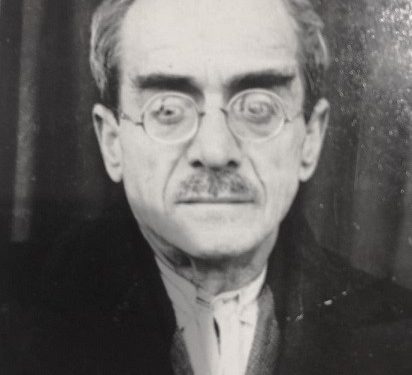

![“After the ’90s, when I was Chief of Personnel at the Berat Police Station, my colleague I.S. told me how they had once eavesdropped on me at the Malinati spring, where I had said about Enver [Hoxha]…”/ The testimony of the former political prisoner.](https://memorie.al/wp-content/uploads/2024/09/admin-ajax-4-350x250.jpg)
